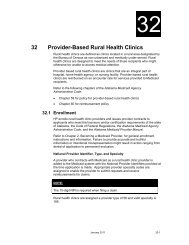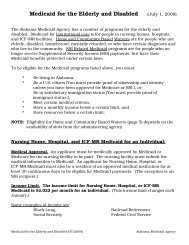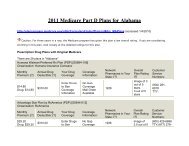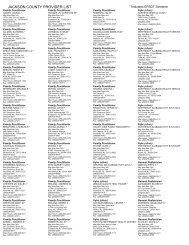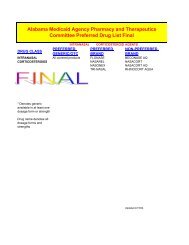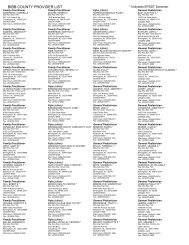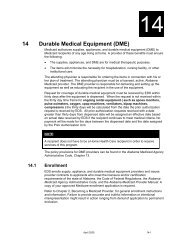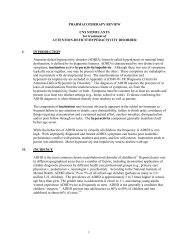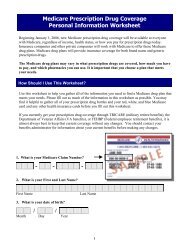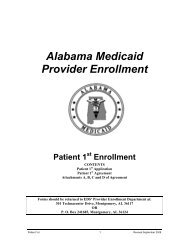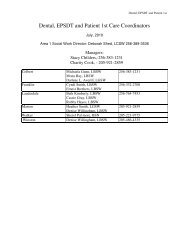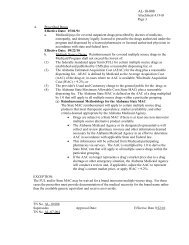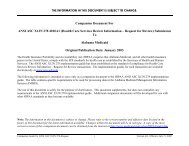Appendix A Well Child Check-Up (EPSDT)
Appendix A Well Child Check-Up (EPSDT)
Appendix A Well Child Check-Up (EPSDT)
You also want an ePaper? Increase the reach of your titles
YUMPU automatically turns print PDFs into web optimized ePapers that Google loves.
<strong>Well</strong> <strong>Child</strong> <strong>Check</strong>-<strong>Up</strong><br />
Key<br />
X Required at the visit for this age<br />
X+ Perform blood lead level if unknown<br />
S Subjective by history and observation<br />
O Objective by standard testing methods<br />
Annually<br />
X-------X One test must be administered during this time frame. Providers have the option of obtaining the lead<br />
and Hct or Hgb at nine or twelve months of age.<br />
Range in which a service may be provided, where X indicates the preferred age<br />
1 If a child comes under care for the first time at any point of the schedule, or if any components are not<br />
accomplished at the recommended age, the schedule should be brought up to date at the earliest<br />
possible time.<br />
2 The physical examination/assessment must include an oral/dental inspection.<br />
3 Urine screening (dipstick) is done if clinically indicated and must be done at 5 years and 11-21 years<br />
of age. (Effective 10/01/2008 urine screening performed only when clinically indicated).<br />
4 All children are considered at risk and must be screened for lead poisoning. A blood lead test is<br />
required at 12 and 24 months of age. Providers have the option of obtaining the lead and Hct or Hgb<br />
at nine or twelve months of age.<br />
X indicated lead screening is required. X+ indicates a screening blood lead test also is required for<br />
any Medicaid-eligible child 36 to 72 months of age who has not previously been screened for lead<br />
poisoning.<br />
5 Health education must include anticipatory guidance and interpretive conference. Youth, ages 12 to<br />
20, must receive more intensive health education that addresses physiological, emotional, substance<br />
usage and reproductive health issues at each screening visit.<br />
6 These screenings must be performed annually. Patient should be rescreened within 30-45 days if<br />
he/she is uncooperative.<br />
7 A child must be referred for an annual complete dental screening beginning at age three to age 21<br />
unless the child is under care. Anticipatory guidance should begin with age one.<br />
8 Please refer to Section A.3.5, Critical Components of Screenings, for detailed information.<br />
9 These laboratory tests do not need to be performed again if you have obtainable, verifiable results.<br />
Screen for PKU and other disorders prior to discharge or 24 hours after birth, according to state law. A<br />
single PKU is adequate when performed at least 24 hours after birth in a well infant or when<br />
performed at 6 to 7 days of age in a premature or ill infant. The newborn screening Program tests<br />
results satisfies this requirement. For more information, please refer to Newborn Screening Program.<br />
A-46 January 2011



